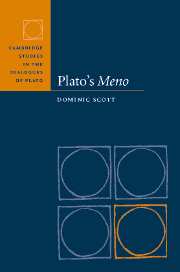Book contents
- Frontmatter
- Contents
- Acknowledgements
- Introduction
- Part I
- Part II
- Part III
- Chapter 11 The method of hypothesis: 86c–87c
- Chapter 12 Virtue is teachable: 87c–89c
- Chapter 13 Virtue is not teachable: 89e–96d
- Chapter 14 Virtue as true belief: 96d–100b
- 15 Irony in the Meno: the evidence of the Gorgias
- Chapter 16 Meno's progress
- Conclusion
- Appendices
- References
- Index of ancient passages
- General index
Chapter 11 - The method of hypothesis: 86c–87c
Published online by Cambridge University Press: 29 September 2009
- Frontmatter
- Contents
- Acknowledgements
- Introduction
- Part I
- Part II
- Part III
- Chapter 11 The method of hypothesis: 86c–87c
- Chapter 12 Virtue is teachable: 87c–89c
- Chapter 13 Virtue is not teachable: 89e–96d
- Chapter 14 Virtue as true belief: 96d–100b
- 15 Irony in the Meno: the evidence of the Gorgias
- Chapter 16 Meno's progress
- Conclusion
- Appendices
- References
- Index of ancient passages
- General index
Summary
INTRODUCTION
By 86c, Socrates appears to have removed the obstacles put in his path at 80b–e. Meno approves of recollection, and certainly accepts that he has a duty to inquire. If Socrates were to have his way from now on, they would immediately resume their search for the definition of virtue.
Before we go any further, it is worth pausing to consider what this inquiry would be like in the light of the methodological and epistemological claims made between 81b and 86c. The problem of discovery required us to start with a known specification of the object of inquiry. In the case of a definitional inquiry, however, there is nothing we can know about virtue without knowing the definition itself. Socrates' solution is to say that we have knowledge unconsciously, but at the conscious level we have to start from mere conjecture. There will be no ‘hard rocks of certainty’ from which to work, and assumptions made at the outset or along the way will be subject to revision. But appearances aside, this inquiry is actually being guided by latent knowledge gradually returning to consciousness.
How in more detail will this process work? We can take our cue from a remark made at 81c9–d3:
Since all nature is akin, and the soul has learnt everything, nothing prevents someone from recollecting just one thing (which people call ‘learning’) and so discovering everything else …
Reality is structured, as was our prior awareness of it.
- Type
- Chapter
- Information
- Plato's Meno , pp. 129 - 144Publisher: Cambridge University PressPrint publication year: 2006



